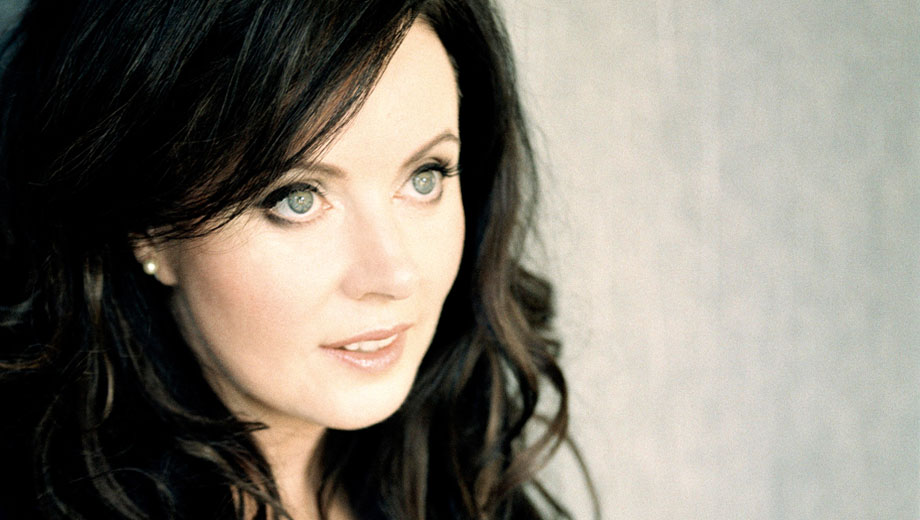
It’s hard to imagine Sarah Brightman could have a single dream left to realize. She’s the world’s biggest selling soprano, an international superstar as beloved for her staggering vocal range (over three full octaves) as for her impassioned film and stage performances. Over a three-decade career, Brightman has passionately pursued (and achieved) a slew of artistic goals, consistently reinventing herself in order to breach new creative ground: she’s sold over thirty million records worldwide, is the first artist to have been invited twice to perform the theme songs at the Olympic Games, and is frequently credited with pioneering the Classical Crossover genre, allowing music once reserved for conservatories and concert halls to seep onto the pop charts. Singing has always been an essential part of her life – the way she expressed herself best. “I was quite deaf when I was a child,” she recalled. “I had problems with my ears. My mother said that speaking wasn’t really how I communicated – I communicated by singing, that was my way. I could always sing.”
Since 1981, when she made her celebrated West End debut in Cats, Brightman has been an inspiring and influential presence in the music scene, and with the release of her eleventh studio album, Dreamchaser, she’s about to become a different kind of pioneer.
For Brightman, Dreamchaser is the realization of a lifelong journey that began when she was a little girl growing up in Berkhamsted, Hertfordshire, England, dreaming of spectacular, unknowable things. “When I look back, my mind’s eye brings me a rush of images from all of the incredible things that I have been privileged to experience in my life,” she explained. “But if I keep tracking back my thoughts eventually come to rest on a flickering TV screen in 1969.” That summer, when Apollo 11 touched down on the moon and Neil Armstrong bounded across its surface, Brightman felt herself transform, and all her hopes and aspirations shift. “Watching the first man land on the moon – it was an epiphany. It changed things. It actually helped me understand what it was that I had to do in my life, to further myself, to do things, to think outside of the box,” she said. “I could go that far, I could do that. From that moment, I started to work really hard.”
Now, at age 52, Brightman is about to embark on what she calls “the greatest adventure I can imagine.” She will be part of a three-person team traveling to the International Space Station on board a Soyuz rocket, where she’ll orbit the earth 16 times daily and become the first professional musician to record a song from space – another ground-breaking moment in a career already riddled with firsts. After undergoing extensive mental and physical testing in Star City, Russia, Brightman was cleared to train as a cosmonaut, and likens the anticipation of her upcoming voyage to being in love. “It’s wonderful,” she said. “It’s this thing that stays beside me as I’m walking down the street.”
In conjunction with her role as a UNESCO Artist for Peace ambassador, Brightman will present life on board the space station – which requires the mindful, shared consumption of resources and an unwavering focus on sustainability – as a model for how we might better inhabit our planet. “Sustainability is a complex concept, sometimes difficult to define. I know from the space training that I have already done that the first objective on a space vehicle or on the Space Station is to make sure that supplies of water and air are preserved. If they fail then the impact is immediate and devastating. Our resources on earth are no different – earth is effectively a space ship which humans inhabit,” she explained.
During her eight day tenure on board the space station, Brightman will proudly advocate for UNESCO’s mandate to promote peace and sustainable development, and upon her return to Earth, she’ll perform various epic Space to Place concerts at UNESCO World Heritage Sites, biosphere reserves, and geoparks. Aside from global environmental concerns, Brightman is also a fervent supporter of women’s education in science. “If I can raise more awareness for women in sciences – that women can train to be astronauts and cosmonauts, and work in engineering fields – then that’s something.”
In the midst of preparing for her mission, Brightman recorded a collection of new songs influenced by her training. “They’re connected subliminally – in the feelings of the songs and what they gave to me, which was something very uplifting, very open, very outward,” she said. “It’s what we do – we look out at the night sky and we dream and we imagine and we explore. The words ‘Dream Chaser’ encapsulate all of that for me.” Dreamchaser is Brightman’s first collaboration with the producer Mike Hedges (U2, Dido, the Cure), who was deeply impressed by her precision and the scope of her vision. “In this day and age of records being cheaper and cheaper and quicker and quicker, when anyone can make a record at home – to actually have an artist who has a vision and the backing to make a great, great record? There are only a handful of artists in the world who can do that,” he said.
“I’m an interpreter of music, and I’m proud of that,” Brightman said. “I’m able to be very free, to go in all directions – to choose music [based on] what it makes me feel within myself. That guides me to what I need to do. It comes from very deep feelings. Although I’m singing other composers’ music, it’s still very connected to me.”
For Brightman, Dreamchaser is a culmination, an ethos – the perfect soundtrack to what’s next for her, and what’s next for all of us. “Humankind’s ability to set and deliver goals combined with the individual’s pursuit of their dreams and desires are perhaps the most powerful forces that we know. Believing that something may be out of reach should never stop us stretching for it – the journey should be as rewarding as arriving at the destination.”

